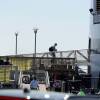Massachusetts-based defense contractor Raytheon is merging with Connecticut-based United Technologies. Raytheon, founded nearly a century ago, is headquartered in Waltham. Gin Dumcius is with the Boston Business Journal. He spoke with WGBH All Things Considered anchor Barbara Howard about what this merger means for the companies and their industries. This transcript has been edited for clarity.
Barbara Howard: The new company is going to be called Raytheon Technologies. This merger will create what's said to be the second-largest aerospace and defense company in the country, trailing behind Boeing, which is number one. Raytheon currently has about 70,000 employees worldwide. Do you have any sense of how many are here in Massachusetts?
Gin Dumcius: Roughly 13,000 is my understanding. They're the third-largest public company in Massachusetts, ranked by 2018 revenue, behind General Electric and TJX Companies.
Howard: I understand they have locations in not just Waltham, the headquarters, but also Boston, Cambridge, Woburn, Andover and Tewksbury. With this merger, should Raytheon workers here in Massachusetts be worried about any layoffs?
Dumcius: I think with any talk of a merger, there is always, I'm sure, some anxiety among employees about overlap. The deal isn't set to close until next year, so there's certainly some time to sort that out. The two CEOs of their respective companies have talked about creating jobs. They plan to keep hiring, but certainly with any sort of merger, there is always talk about efficiency and trying to find ways to cut.
Howard: It looks as though there will be a shakeup in the leadership?
Dumcius: Yes, and what that means exactly is Tom Kennedy, Raytheon's current CEO, will be named Executive Chairman of the combined company, and Greg Hayes, the CEO of United Tech, will be named CEO. Two years after the completion of the merger, Hayes will assume the roles of chairman and CEO.
Read more: Raytheon And United Technologies To Create A Defense Giant
Howard: What is the purpose of this merger?
Dumcius: They're trying to dominate and create a massive aerospace and defense contractor. There's been a lot of consolidation in the defense industry overall, and I think Raytheon is looking for sure footing here. Certainly that's going to have a ripple effect that we still have to figure out exactly what that means. But it's certainly going to put pressure on Boeing and any other defense contractors now that there's going to be this new behemoth, assuming this merger goes through.
Howard: What could be the upshot of this deal for the business world more broadly?
Dumcius: For the shareholders, the pitch on this is that it's going to be pretty good for them. It's not necessarily the merger of equals that it's being touted as. United Technologies shareholders would acquire 57 percent of shares in the new company, while Raytheon would own about 43 percent. I believe there is one analyst who suggests the merger makes sense, but the combined company overall will be able to withstand some of the unpredictability of the national debt, as well as the kind of ups and downs of the long-term economy, along with potential worldwide threats coming from China and Russia.
Howard: Is this merger facing any regulatory hurdles?
Dumcius: The two CEOs have been kind of on a roadshow, and they're claiming that there shouldn't be any regulatory hurdles. They're saying their overlap in sales is roughly 1 percent. President Trump did raise his concerns about exactly what this means. He's raising potential competition concerns, and the two CEOs are trying to downplay that as much as possible.
Howard: What does it mean in terms of things that would affect people in the Boston area, like housing? Will it put extra pressure on the demands for housing?
Dumcius: The pressure is going to keep increasing on transportation and on more housing. It's something that Massachusetts leaders are very aware of. They are trying to work on fixing it, but it could be too little too late, especially as more and more companies keep coming and bringing their workers with them.
Howard: That's Gin Dumcius of the Boston Business Journal, speaking with us about the newly-announced merger between Waltham-based Raytheon and Connecticut-based United Technologies.




